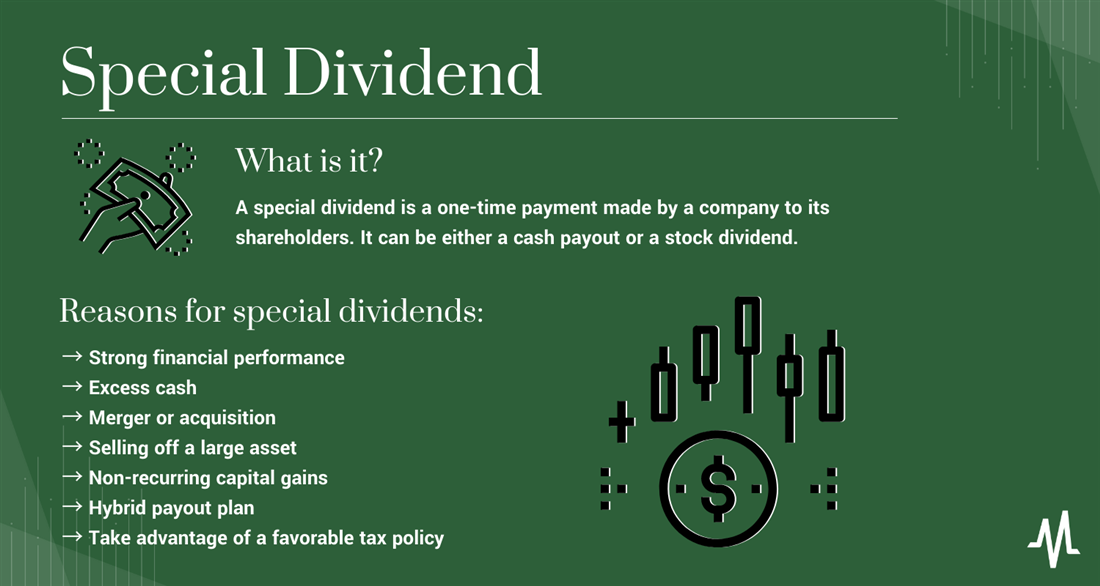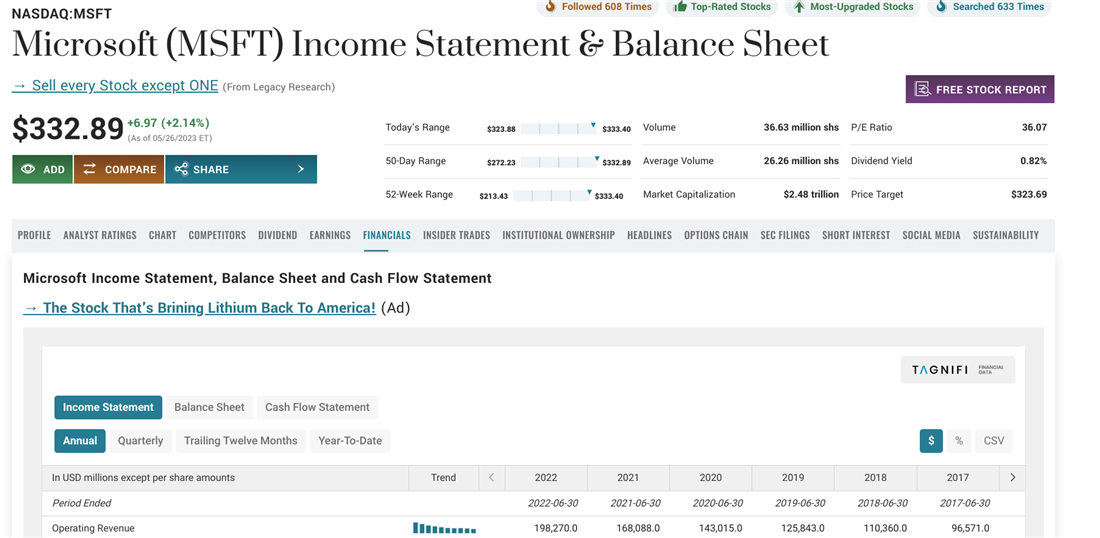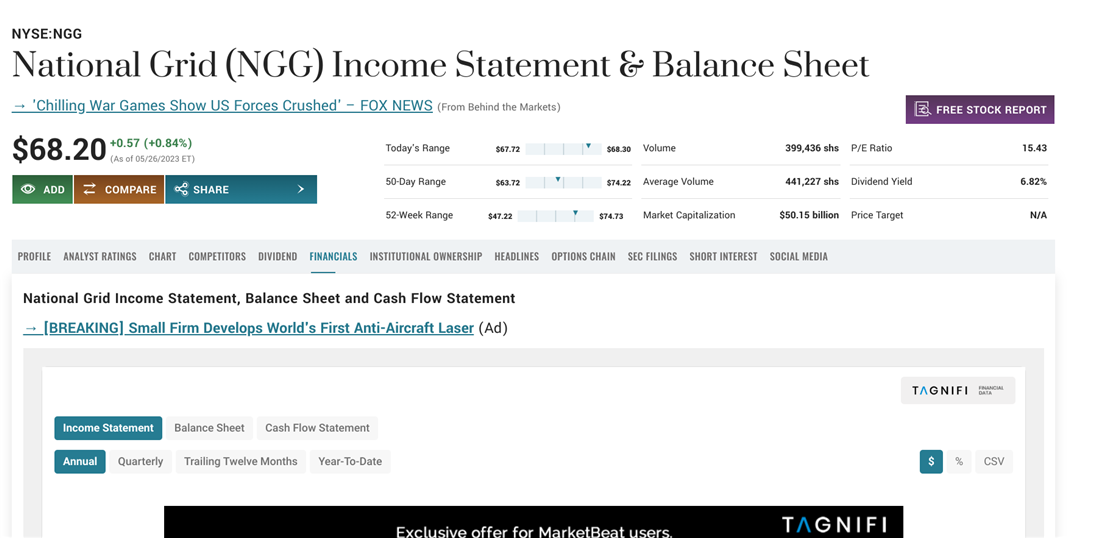Special dividends can provide you with a nice short-term return on your investments. By the time you're done reading this article, you'll know what a special dividend is, why it's issued and how you may be able to cash in.
Overview of Special Dividends
A special dividend can pay out when a company has strong earnings, has a large overabundance of cash or needs to distribute large amounts of profits to avoid paying higher taxes. Special dividends are also regularly used in mergers and acquisitions to help buy out resistant shareholders. Special dividends can be a great way to boost your portfolio in the short term, but they can also indicate a company facing financial difficulty.
Companies can only pay out special dividends if their financial statements indicate that they can afford to, and it's wise to check the company's recent performance and future prospects before you invest anything. Find out if the company plans to continue to issue special dividends in the future or if this is a one-time event.
Special Dividends vs. Regular Dividends
A regular dividend, also known as a quarterly dividend, is a payment made by a company (such as those on the list of MarketBeat's Top Dividend Stocks) to its shareholders quarterly, usually in cash or stock.
A quarterly dividend is considered part of the company's normal operations and provides consistent income. A special dividend, however, is an unexpected one-time dividend that can be either cash or stock, which gets paid out in addition to the regular dividend payments. Companies may elect to pay out special dividends for any number of reasons, such as increased profits or an overabundance of cash. Or it could have undergone a merger or acquisition.
Why Do Companies Pay Special Dividends?
Companies may pay dividends for a variety of reasons, such as:
- Strong financial performance: When a company has an exceptional year in terms of earnings, it may choose to reward its shareholders by announcing a special dividend, especially when the company doesn't have a history of consistent dividend payouts. This can help boost morale among investors and make the company more attractive to potential ones.
- Excess cash: If a company has more cash than it needs for its operations and growth plans, it can use the funds to issue a special dividend to shareholders, especially when it doesn't have any viable investment opportunities or is looking to manage its tax liability.
- Merger or acquisition: Companies involved in mergers or acquisitions may issue special dividends to buy out resistant shareholders. Usually, when a company acquires another, it will offer shareholders of both companies some compensation. This can be done by issuing stock in the new company that's being formed or by issuing cash payments. Special dividends are one way of incentivizing them to accept the offer.
- Selling off a large asset: A company might sell off a large asset while going through corporate restructuring. Selling off a significant asset involves taking profits from the sale of that asset and distributing them among shareholders in the form of a special dividend.
- Non-recurring capital gains: This type of capital gain can occur when a company has an equity stake in a company it lends to. One reason for this is that the company's payout ratio stays at the same level, which could make investors and shareholders question the sustainability of the regular dividend.
- As part of a hybrid payout plan: In a hybrid payout plan, a company will issue a defined quarterly dividend and issue a stock special dividend annually that will bring their dividend payout ratio to the percentage of earnings per share (EPS) they want. Companies whose earnings can be cyclical may choose the flexibility of this dividend strategy to reward long-term shareholders while still having the cash on hand to address the needs of their capital-intensive business.
- To take advantage of a favorable tax policy: In 2012, a record number of companies issued special dividends due to the uncertainty of whether the tax cuts issued by the Bush Administration would expire and raise the tax rate for qualified dividends from 15% to being taxed as regular income. In general, companies sometimes distribute large amounts of profits as a special dividend to avoid paying higher taxes on their profits. They can reduce their overall taxable income while still rewarding their shareholders.

Example of Special Dividends
On July 20, 2004, Microsoft Corporation (NASDAQ: MSFT) declared it would give out a special payout of $3 per share to shareholders on record since Nov. 17 of that year. On Dec. 2, the company distributed $32 billion in dividends. This was a huge chunk of the cash it had on hand at the time. This particular payday was especially appealing for investors, as it offered them extra capital and ensured that institutional investors were still confident in the company's long-term prospects.

The reason behind the special dividend was that the strong Microsoft balance sheet and growth prospects were providing the company with excess cash.
Instead of paying taxes on idle capital, they returned significant cash to their shareholders instead of investing it in future projects.
However, it paid off for them. The confidence instilled by this special dividend shines through today as Microsoft continues to innovate and grow.
Effects of Special Dividends on Stock Price
A special dividend may seem like a sign of financial health, but it has consequences. When a company issues a special dividend, its stock tends to fall by the same amount as the dividend when trading starts on the ex-dividend day. In other words, it's not wise to buy stocks just for the extra payout, as it can cause long-term loss of value. The ex-dividend date is set, but a large special dividend could prompt stop-loss orders, meaning investors sell the stock if it drops to a certain price, and margin calls, meaning investors buying on margin would have to add additional equity into their accounts to cover any potential losses.
This is why companies use "due bill" documents to adjust the ex-dividend date for maximum efficiency. However, no amount of adjustment can keep a special dividend from cutting into a company's stock price.
Pros and Cons of Special Dividends
Special dividends are an unexpected windfall, making them very appealing. However, they also have their downsides. Read on to find out the pros and cons of a special dividend.
Pros
Special dividends can offer a wide range of benefits, including:
- Rewards: Special dividends reward long-term shareholders who have invested in the company over time, with companies using the flexibility to pay out quick returns without having to dip into their reserves or issue new shares.
- Flexibility: They offer flexibility for companies whose earnings can be cyclical and require a cash reserve.
- Favorable tax policies: Special dividends allow you to take advantage of favorable tax policies, potentially saving you money.
- Returns cash to shareholders: Special dividends allow companies to return excess cash to shareholders rather than reinvesting in the business or making acquisitions.
- Distribute gains: Special dividends enable companies to distribute gains from asset sales or other one-time events.
Cons
However, there are also some negatives associated with special dividends:
- Falling stock prices: Stock prices tend to fall on the ex-dividend date due to the large payout.
- Losses: If a stock's share price falls below its special dividend payment, it can result in a loss for you as an investor.
- Taxable as ordinary income: The special dividend is taxable as ordinary income and may lead to higher taxes.
- Overly reliant: Companies may become overly reliant on special dividends, leading to excessive debt and weakened long-term profitability.
- Companies may forgo other opportunities: Companies may also forgo investing in future growth opportunities by paying out special dividends.
- Investor uncertainty: As an investor, you don't know whether the company will continue paying out special dividends in the future or if it's just a one-time event, in which case you may not reap any long-term rewards from your investment.
A Special Gift for Shareholders
Special dividends can offer you an excellent return on your investments in the short term. However, these large payouts come with some potential downsides. Research the company's financial situation and understand all the risks before investing in a stock that has issued or announced a special dividend to maximize returns without taking on too much risk.
FAQs
Now that you've read about special dividends and how and why they're issued, you probably have a better understanding of the ins and outs of this welcome bonus for investors. Read on if you still have questions or wondering, "What is special dividend?".
How does a special dividend work?
A special dividend is an unexpected payout of cash or stock to shareholders from a company. This dividend is typically larger than the normal dividends you're used to receiving, and the company may have some specific reasons for issuing it. Investors can use special dividends as a reward for long-term investors, to take advantage of favorable tax policies, as a return on a sale of an asset or as a result of other one-time events.
What is an example of a special dividend?
An example occurred in 2017 when a utilities sector stock, National Grid Plc (NYSE: NGG) issued a special dividend of $17.2 billion after it sold 61% of its United Kingdom gas distribution business. This special payment represented a significant portion of the company's profit for the year, as we can see below when we examine their financials on MarketBeat. Investors were excited to get this large return.

Is a special dividend good or bad?
Generally, special dividends are good because they offer you a sudden cash or stock bonus. However, special dividends can also pressure companies financially, and you must consider taxes when receiving one. Do your research and weigh the risks and rewards before investing in any security promising a special dividend.
